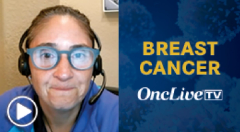
Dr. Conlin on the Practice-Changing Data of Trastuzumab Deruxtecan in HER2+ Breast Cancer
Alison K. Conlin, MD, discusses the practice-changing data of fam-trastuzumab deruxtecan-nxki in HER2-positive breast cancer.
Alison K. Conlin, MD, medical oncology, Providence Cancer Institute Franz Clinic, discusses the practice-changing data of fam-trastuzumab deruxtecan-nxki (Enhertu) in HER2-positive breast cancer.
The phase 3 DESTINY-Breast03 trial (NCT03529110) evaluated the safety and efficacy of the antibody-drug conjugate (ADC) trastuzumab deruxtecan vs ado-trastuzumab emtansine (T-DM1; Kadcyla) in patients with HER2-positive, unresectable or metastatic breast cancer.
The benefit in responses and progression-free survival elicited by trastuzumab deruxtecan compared with T-DM1 served as practice-changing data, Conlin says. In May 2022,
Though the toxicity profile of trastuzumab deruxtecan should be discussed with patients, the high clinical benefit observed with the ADC also offers great promise for patients with HER2-positive breast cancer, Conlin concludes.






































